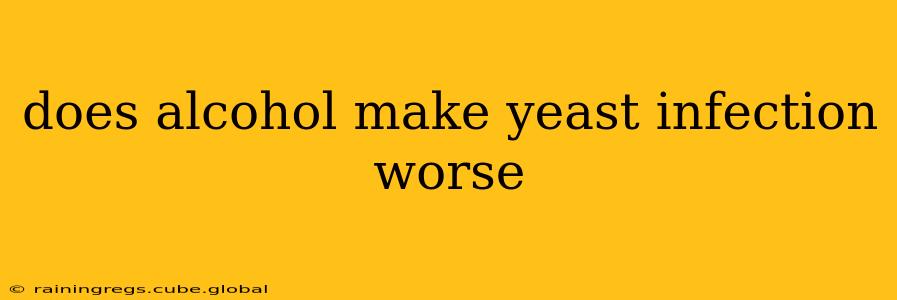Does Alcohol Make Yeast Infections Worse?
Yeast infections, medically known as candidiasis, are common fungal infections often affecting the vagina in women and sometimes the mouth or other areas of the body. Many people wonder about the relationship between alcohol consumption and the severity or likelihood of yeast infections. The short answer is: yes, alcohol can potentially worsen yeast infections, or at least increase the risk of developing one. However, the connection isn't always straightforward, and more research is needed to fully understand the complex interplay.
Here's a detailed look at why this might be the case, addressing some common questions:
How Does Alcohol Affect Yeast Infections?
Alcohol doesn't directly cause a yeast infection, but it can exacerbate symptoms and potentially increase susceptibility. Here's why:
-
Immune System Suppression: Excessive alcohol consumption weakens the immune system. A weakened immune system makes it harder for your body to fight off opportunistic infections like yeast, which thrives when the body's defenses are down. This makes you more vulnerable to developing a yeast infection or experiencing a more severe infection if you already have one.
-
Gut Microbiome Disruption: Alcohol can disrupt the delicate balance of bacteria in your gut. This imbalance can influence the overall health of your microbiome, potentially leading to an overgrowth of yeast in the gut and potentially spreading to other areas of the body. A healthy gut microbiome plays a crucial role in maintaining overall health and immune function.
-
Blood Sugar Imbalances: Alcohol can impact blood sugar levels, causing fluctuations. High blood sugar can feed yeast, creating a favorable environment for its growth and potentially worsening existing infections.
-
Dehydration: Alcohol is a diuretic, meaning it increases urination and can lead to dehydration. Dehydration can further weaken the immune system and potentially make yeast infections more uncomfortable.
-
Medication Interactions: If you're taking antifungal medication for a yeast infection, alcohol could interact negatively, potentially reducing the effectiveness of the treatment or causing unpleasant side effects. Always consult your doctor or pharmacist about potential drug interactions with alcohol.
Can Alcohol Trigger a Yeast Infection?
While alcohol doesn't directly trigger a yeast infection, it can create an environment where yeast is more likely to flourish. Individuals already predisposed to yeast infections (due to factors like diabetes, antibiotic use, or weakened immunity) may find that alcohol consumption increases their risk of developing an infection or experiencing a flare-up.
Does Alcohol Make Yeast Infection Symptoms Worse?
Yes, alcohol can exacerbate existing yeast infection symptoms. The inflammation and irritation associated with a yeast infection can be intensified by alcohol consumption, leading to increased discomfort, itching, burning, and pain.
What Kind of Alcohol Is Worst for Yeast Infections?
There's no specific type of alcohol definitively proven to be "worse" than others in relation to yeast infections. However, the quantity and frequency of alcohol consumption are far more significant than the type of alcoholic beverage. Excessive consumption of any alcoholic beverage can negatively impact your immune system and potentially worsen a yeast infection.
How Can I Reduce My Risk of Yeast Infections While Drinking Alcohol?
If you choose to drink alcohol, moderation is key. Limit your consumption, stay hydrated, and maintain a healthy diet to support your immune system. Furthermore, practicing good hygiene and wearing breathable clothing can also help reduce your risk.
Disclaimer: This information is for educational purposes only and is not a substitute for professional medical advice. If you suspect you have a yeast infection or are experiencing related symptoms, consult a healthcare professional for proper diagnosis and treatment. They can provide personalized advice based on your individual health situation.
